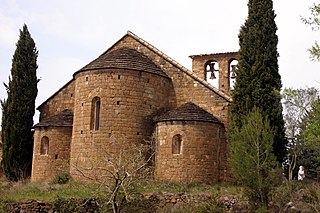
Sankt Florian is a town in the Austrian state of Upper Austria. It is 10 miles (16 km) from Linz.

Saint Wigbert, (Wihtberht) born in Wessex around 675, was an Anglo-Saxon Benedictine monk and a missionary and disciple of Saint Boniface who travelled with the latter in Frisia and northern and central Germany to convert the local tribes to Christianity. His feast day is August 13.

Nütschau Priory is a house of the Benedictine Order located at Travenbrück near Bad Oldesloe, Stormarn, Schleswig-Holstein in Germany.

Reichenbach Priory was a Benedictine monastery, located at Klosterreichenbach, now part of Baiersbronn in Baden-Württemberg in Germany.

St. Gabriel's Priory, formerly St. Gabriel's Abbey, is a Benedictine nunnery in Sankt Johann bei Herberstein, Styria, Austria.
Åsebakken Priory, or the Priory of Our Lady of Åsebakken, is a Benedictine monastery of nuns at Birkerød, about 20 km north of Copenhagen in Denmark. The priory is part of the Beuronese Congregation within the Benedictine Confederation.

St. Ulrich's Priory in the Black Forest was a priory of Cluny Abbey founded in the valley of the River Möhlin in the Black Forest in about 1083. St. Ulrich is now part of the municipality of Bollschweil, in the district of Breisgau-Hochschwarzwald, Baden-Württemberg, Germany.
Sölden Priory was initially a Cluniac monastery of nuns, established in 1115 at Sölden in the district of Breisgau-Hochschwarzwald in the Black Forest, Baden-Württemberg, Germany. In the 16th century it became a community of monks.

Saint Blaise Abbey was a Benedictine monastery in the village of St. Blasien in the Black Forest in Baden-Württemberg, Germany.

Stiepel Priory is a Cistercian monastery in Stiepel in Bochum, North Rhine-Westphalia, Germany.

Hersfeld Abbey was an important Benedictine imperial abbey in the town of Bad Hersfeld in Hesse, Germany, at the confluence of the rivers Geisa, Haune and Fulda. The ruins are now a medieval festival venue.

St. Peter's Island is a peninsula and former island situated in Lake Biel in the canton of Bern, Switzerland. It has a length of about 5 kilometres (3.1 mi) and a maximum width of 800 metres (2,600 ft). Its highest point is 474 metres (1,555 ft) above sea level or 45 metres (148 ft) above lake level. It was formed in the last Ice Age, when the Rhône Glacier reached as far as the Jura mountains. It is a promontory of the Jolimont, above Erlach. Politically the island is split between the municipalities of Erlach and Twann-Tüscherz, the largest part belonging to the latter municipality.

St. Florian Monastery is an Augustinian monastery in the town of Sankt Florian, Austria. Founded in the early ninth century, and later refounded by Augustinians in the eleventh century, St. Florian is the largest monastery in Upper Austria, and rivals Melk Abbey and Klosterneuburg Monastery as among the most impressive examples of Baroque architecture in Austria. The monastery is dedicated to Saint Florian, whose fourth century grave lies beneath the monastery.

The Diocese of Sankt Pölten is a diocese located in the city of Sankt Pölten in the Ecclesiastical province of Wien in Austria.

Östanbäck Monastery is a Lutheran Benedictine monastery for men in the Church of Sweden, located outside Sala in Sweden.

Ringsted Abbey was one of the earliest and most influential Benedictine houses in Denmark, active from the late 11th-century until the Danish Reformation. It was located at Ringsted on the Danish island of Zealand.

St. Peter's Priory was one of Denmark's early monastic houses. It was located in Lund, Skåne, now southern Sweden, formerly part of Denmark.

Sant Sepulcre de Palera is a Benedictine monastery in Beuda, in the comarca of Garrotxa, Province of Girona, Catalonia, Spain. The priory was consecrated by Bishop Berengar of Berga in 1085, with the assistance of the bishops of Barcelona, Carcassonne, Albi and Elne. In 1107 it became part of the monastery of Santa Maria de la Grasse until the sixteenth century, when it became a pilgrimage centre known as Santo Domingo de Palera. In 1936 the temple was desecrated and several figures and parts of altarpieces disappeared. It became a Bien de Interés Cultural site on 24 September 1964.
















